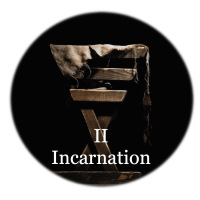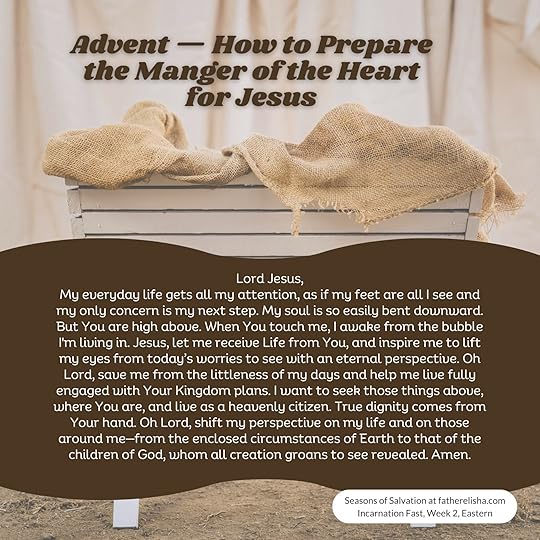Incarnation Fast 2 (Eastern): Advent — How to Prepare the Manger of the Heart for Jesus

 The Spiritual Mysteries of the Divine Calendar: Advent — How to Prepare the Manger of the Heart for Jesus ~ November 23–29, 2025 ~
The Spiritual Mysteries of the Divine Calendar: Advent — How to Prepare the Manger of the Heart for Jesus ~ November 23–29, 2025 ~ The Nativity Fast—also called the Advent or Incarnation Fast—began on November 15, and the first Sunday of Advent is now only a week away. These weeks of Advent are counting down to the most revolutionary event in human history, the moment that reset our calendar.
In Jewish tradition, the calendar counts years from the calculated date of the creation of the world. But with the coming of God in the flesh, Jesus Christ, we begin again from year 1—no longer from the creation of the world, but from the beginning of the re-creation of mankind, the making of the new man in Jesus Christ.
No other event in history has ever become the reference point for all that happens. Perhaps the only future event that could challenge AD (Anno Domini, “in the year of our Lord) and BC (Before Christ) is the Second Advent of Jesus Christ. Perhaps His return will introduce a new marker: SC—Second Coming?
Last week we entered the second Season of Salvation in the Divine Calendar and began introducing The Nativity Fast and Its Mysteries. In Week 2 of the Season of the Incarnation, we continue to explore the spiritual mysteries woven into these weeks of Advent and how the Holy Spirit desires to help us prepare the manger of our heart for Jesus.
We also just celebrated The Presentation of the Virgin Mary in the Temple, a feast that reveals the restoration of glory to mankind and other mysteries bound to this spiritual season.
Eastern Old CalendarIf you attend an Eastern Old Calendar parish, this week would correspond to Week 10 in the Season of the Kingdom of God. The post The Bleeding Woman — How Faith Touches the Heart of Jesus aligns with your current place in the Divine Calendar, even though it follows the Gospel reading for the New Calendar.
The Beginning of Our Salvation
The beginning of Christ’s Incarnation took place with the miraculous conception in the Virgin Mary, revealed nine months later on Christmas day. The Incarnation initiated God’s work to abolish “in His flesh the enmity, that is, the law of commandments contained in ordinances, so as to create in Himself one new man from the two, thus making peace” (Eph. 2:15). The Evangelist John writes, “And the Word became flesh and dwelt among us” (John 1:14)—an event of infinite mysteries and profound implications.
The creation of the one new man in Jesus Christ was declared complete on the Cross: “It is finished!” (John 19:30). In Christ’s Resurrection, His body proved to be our victory over death—“and declared to be the Son of God with power according to the Spirit of holiness, by the resurrection from the dead” (Rom. 1:4). This new human nature became ours through Jesus’s Ascension and the pouring out of the Holy Spirit at Pentecost (we will explore these events in depth in the spring).
God taking on a human body is the beginning of our salvation. Without the Incarnation—without God the Son walking among us as a human being—there would be no Easter. As we studied last week, the Incarnation marks the beginning of Christ’s work of salvation.
Scripture ReferencesThe creation of the first man: “And the Lord God formed man of the dust of the ground, and breathed into his nostrils the breath of life; and man became a living being” (Gen. 2:7).The creation of the new man: “He breathed on them, and said to them, ‘Receive the Holy Spirit’” (John 20:22).The first and the last Adam: “It is sown a natural body, it is raised a spiritual body. There is a natural body, and there is a spiritual body. And so it is written, ‘The first man Adam became a living being.’ The last Adam became a life-giving spirit. […] The first man was of the earth, made of dust; the second Man is the Lord from heaven. As was the man of dust, so also are those who are made of dust; and as is the heavenly Man, so also are those who are heavenly. And as we have borne the image of the man of dust, we shall also bear the image of the heavenly Man” (1 Cor. 15:44–45, 47–49).

Photo by Sarah Penney on Unsplash
The Key to the Season of the Incarnation FastEach Season of Salvation can pass unnoticed if we do not enter the spiritual atmosphere of the season. How do we enter it? By turning the key.
The key to the first Season of Salvation, the Season of the Kingdom of God, was repentance. By seeking the Holy Spirit to search the depths of our souls, we sought to identify the absence of Christ’s Lordship and the reign of His Majesty, King Ego. We also glimpsed what God desires to establish as our new normal, while become aware of what hinders its fulfillment.
In the upcoming Feasts of the Incarnation, we will receive the very life of the new human nature in Jesus, directly into the area void of Christ’s Lordship. As we repented—the key to the first Season of Salvation—to the best of our ability, we entered the atmosphere of these two colliding kingdoms within our souls.
If that felt difficult, even to comprehend, continue pressing on. “I press toward the goal for the prize of the upward call of God in Christ Jesus” (Phil. 3:14).
Repentance is a battle, especially with ourselves. If we struggled to experience it in the previous Season, it means we fought—and laid the foundation for the six-week period we entered last week.
Now our repentance takes on a different focus. Previously, it was about identifying the absence of the Kingdom of God within. During the Nativity Fast, repentance is about emptying, as best we can, the lifestyle under the reign of His Majesty, King Ego.
Made Himself of No Reputation
The Apostle Paul writes, “Let this mind be in you which was also in Christ Jesus, who, being in the form of God, did not consider it robbery to be equal with God, but made Himself of no reputation, taking the form of a bondservant, and coming in the likeness of men” (Phil. 2:5–7). This verse holds the key to the Fast of the Incarnation.
In Greek, “made Himself of no reputation” is kenoo, which means “to make empty.” From this comes the theological term kenosis. This reveals the unfathomable humility of the Son of God. When God became man, Jesus willingly set aside the divine attributes of His glory.
During the Incarnation, Jesus emptied Himself of His radiant splendor and appeared as a beautiful baby boy. Before the Resurrection, He unveiled His divine nature most profoundly in the Transfiguration, when “His face shone like the sun, and His clothes became as white as the light” (Matt. 17:2). Just as Jesus emptied Himself of His divine radiance to enter our world, so the Holy Spirit calls us to prepare for the Feast of the Nativity (Christmas) by emptying ourselves of personal glory and self-exaltation.
Emptying
The key to entering this season is emptying. What does it mean to empty ourselves of personal glory and self-exaltation? It likely needs little explanation: this is how the reign of His Majesty, King Ego, manifests in our lives. This is not the self-emptying of consciousness described in New Age spirituality or Eastern religions. Here, we are emptied so that we may be filled with Jesus Christ.
In Philippians 2:5, we read, “Let this mind be in you which was also in Christ Jesus…” The emptying of the Incarnation Fast is a voluntary humbling of ourselves, motivated by our longing to be filled with Jesus’s divine-human nature and to receive the glory that comes from God. As Jesus said in Luke 14:11, “He who humbles himself will be exalted,” and in John 5:44, “How can you believe, who receive honor from one another, and do not seek the honor that comes from the only God?”
It is crucial to understand that this is not about ridiculing ourselves before others, but about putting ourselves last and honoring God and others above ourselves. We do not seek attention through acts of self-emptying, “so that you do not appear to men to be fasting, but to your Father who is in the secret place; and your Father who sees in secret will reward you openly” (Matt. 6:18).
If we cultivate this mind—the mind of Jesus Christ—emptying ourselves of our status, we turn the key and enter the mystical atmosphere of the Incarnation Fast.
Advent Preparations: How Can We Do This Practically?
Let us continue from where we left off last week regarding fasting. By voluntarily changing and simplifying our diet for forty days, we automatically turn the key to the Season of the Incarnation Fast.
Voluntary restriction of our desires strengthens both self-control and self-denial and helps us open ourselves to the inspiration of the Holy Spirit. One practical way to empty ourselves is to follow the example of Christians who have fasted for centuries during the forty days leading to Christmas.
Why does the culture of the world push the exact opposite during this season? Why has the way the world celebrates Christmas become a materialistic, gluttonous feast? Well, now we understand: the enemy works hard before Christmas to fill mankind—physically and soulishly—drowning out the Holy Spirit’s call to empty ourselves and receive Christ, the King.
The Evangelist John writes, “For all that is in the world—the lust of the flesh, the lust of the eyes, and the pride of life—is not of the Father but is of the world” (1 John 2:16). We remember that in the Garden of Eden, the serpent led Eve to see “the tree was good for food, that it was pleasant to the eyes, and a tree desirable to make one wise, she took of its fruit and ate” (Gen. 3:6).
But we know the truth, as Jesus said: “For My flesh is food indeed, and My blood is drink indeed. He who eats My flesh and drinks My blood abides in Me, and I in him” (John 6:55–56).
Dethroning of the Self During Advent
Another practical way to enter this fast is through praying—asking God for opportunities to empty ourselves. This is a bold prayer, but if you pray it, God will answer. But He is unfathomably compassionate and, knowing us far better than we know ourselves, allows no temptation to overtake us “except such as is common to man; but God is faithful, who will not allow you to be tempted beyond what you are able, but with the temptation will also make the way of escape, that you may be able to bear it” (1 Cor. 10:13).
God loves these prayers, and we never need to fear.
The practical ways we turn the key and enter the atmosphere of this Fast will vary from person to person. Yet for all of us, the emptying pertains to the area of our soul where His Majesty, King Ego, reigned—and where the grace of Christ will arrive during the Incarnation Feasts.
These six weeks of fasting sharpen our preparation for the dethroning of the self and the extension of Christ’s reign in the soul. In the previous Season of Salvation, we began identifying this area; now we zoom in to empty it, creating space for Christ to come.
The key for the weeks following the fast—the Incarnation Feasts—is the Empty Manger. Our soul is not merely an empty space; it is prepared to receive the divine seed of Jesus’s human nature, the new man.
The Upward Direction of Fasting During Advent
Another way to practice this fast is by slightly increasing our consistent devotion to Jesus. When we fast or perform acts of self-emptying, we restrict the activity of our fallen human nature. These are inward acts.
But there are also upward activities that stir and release our spirit. These become more prominent during these weeks as we read the Word of God, pray, meditate silently on Scriptures, worship, and engage in other spiritual exercises. This upward dimension of fasting balances the inward restrictions of the flesh, for the grace to maintain a healthy fast comes from our devotion to Jesus.
If we increase our efforts in restricting the flesh, we must equally increase our efforts in stirring the spirit. Practically speaking, if we skip breakfast every Wednesday and Friday during this fast, we should not spend that time on social media or homework. Rather, we fast from a meal so we can read, pray, or engage in other forms of worship. When these two directions of fasting work together, we quickly enter the atmosphere of the Incarnation (Nativity) Fast.

Photo by Igor Rodrigues on Unsplash
Sunday Gospel for Advent: Luke 12:16–21 (NKJV)Then He spoke a parable to them, saying: “The ground of a certain rich man yielded plentifully. 17 And he thought within himself, saying, ‘What shall I do, since I have no room to store my crops?’ 18 So he said, ‘I will do this: I will pull down my barns and build greater, and there I will store all my crops and my goods. 19 And I will say to my soul, “Soul, you have many goods laid up for many years; take your ease; eat, drink, and be merry.” ’
20 But God said to him, ‘Fool! This night your soul will be required of you; then whose will those things be which you have provided?’
21 “So is he who lays up treasure for himself, and is not rich toward God.”
Valuing God’s Treasure
In this week’s Sunday Gospel, just before Jesus tells the parable of the rich man and his barn, He says: “Take heed and beware of covetousness, for one’s life does not consist in the abundance of the things he possesses” (Luke 12:15).
Our life does not consist in the things we possess.
“Soul, you have many goods laid up for many years; take your ease; eat, drink, and be merry” (Luke 12:19). This was the rich man’s plan once he had built a larger barn to store his plentiful harvest—which God had given him in the first place (Deut. 8:18; 1 Cor. 3:6). He moved out of God’s provision as a loving Father, allowing his material wealth to gain authority over him.
The rich man trusted in his earthly riches, and we are reminded: “how hard it is for those who trust in riches to enter the kingdom of God! It is easier for a camel to go through the eye of a needle than for a rich man to enter the kingdom of God” (Matt. 10:24b–25).
Jesus concludes, “So is he who lays up treasure for himself, and is not rich toward God” (Luke 12:21). During the Nativity Fast, we seek to surrender and empty ourselves of any earthly treasure that has gained authority over us. The grace of this fast helps us see the limited value of earthly treasures compared with the eternal riches of God’s treasure.
What Are Earthly Treasures?
“For all that is in the world—the lust of the flesh, the lust of the eyes, and the pride of life—is not of the Father but is of the world” (1 John 2:16). These can include material possessions, social status, relationships, professional prestige—anything that gains authority over our hearts.
These things are not inherently bad, but when they replace God’s role and we forget that He alone provides for our needs, they become earthly treasures.
What Is God’s Treasure?
“For it is the God who commanded light to shine out of darkness, who has shone in our hearts to give the light of the knowledge of the glory of God in the face of Jesus Christ. But we have this treasure in earthen vessels, that the excellence of the power may be of God and not of us” (2 Cor. 4:6–7).
God’s treasure is the knowledge—spiritual light—of the glory of God in the face of Jesus. His face shines “like the sun shining in its strength” (Rev. 1:16), and His grace will continue to unfold: “That in the ages to come He might show the exceeding riches of His grace in His kindness toward us in Christ Jesus” (Eph. 2:7). These riches are so vast they will continue to reveal themselves in eternity.
At the end of the Sunday Gospel, Jesus says in Luke 12:21: “So is he who lays up treasure for himself, and is not rich toward God.” To be rich toward God means to be filled with grace—the Holy Spirit.
During the Nativity Feasts, the Holy Spirit imparts the very life of Jesus Christ into us. “In Him was life, and the life was the light of men. And the light shines in the darkness …” (John 1:4–5a). This divine-human life of Jesus is our true treasure—the grace of the Incarnation. “To them God willed to make known what are the riches of the glory of this mystery among the Gentiles: which is Christ in you, the hope of glory” (Col. 1:27).
Fixing Our Eyes During Advent
This is our most important focus during the weeks of the Nativity Fast: fixing our eyes, longing, and praying toward Jesus Christ so that He becomes our very life. “When Christ who is our life appears …” (Col. 3:4a).
Let us pray this week that the Holy Spirit gives us a holy craving for Christ’s life to become our own. Then, earthly treasures become mere blessings—good gifts with no strings attached.
Concluding Advent — How to Prepare the Manger of the Heart for JesusIt is a true honor for me that you are part of this journey. Thank you for taking the time to read. I pray this contribution may bless you as we travel another week into the Season of the Incarnation.
If you are taking part in the Nativity (Advent) Fast from November 15 – December 24 (November 28 – January 6 on the Old Calendar), you may find it helpful to review what we discussed last time in What Is Fasting?
Please leave a comment below—we’d love to hear your thoughts. If you found this post helpful, feel free to share it using the buttons at the top of the page.
Join the Journey Through the Seasons of SalvationJoin us on this weekly journey through the Seasons of Salvation as we walk in the footsteps of Jesus Christ through the key seasons of His life.
Sign up to receive this year’s Divine Calendar, which introduces the Seasons of Salvation and guides you through the journey ahead. As a welcome gift, you’ll also receive my young adult novel, The Legend of the Divine Calendar, delivered straight to your inbox.
Visit the Seasons of Salvation blog for insights into the coming week, posted every Saturday. We’d be honored to have you join us.
Save Your Prayer Card on Your Smartphone

Photo by Matt Botsford on Unsplash
The post Incarnation Fast 2 (Eastern): Advent — How to Prepare the Manger of the Heart for Jesus first appeared on Father Elisha: Let me take you on an intriguing journey..



